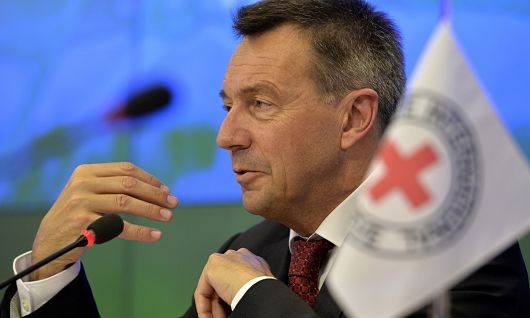Red Cross President Warns that Global Conflict is Changing Humanitarian Work

Peter Maurer, president of the International Committee of the Red Cross (ICRC), recently warned the public that the consistent growth of several regional conflicts has encumbered the organizations efficacy in responding to such global crises.
Noting that the operational budget of the ICRC has surged by nearly 50% in only the last three years, Maurer cited the “extraordinary period” of persistent humanitarian emergencies as the leading cause for such large increases in operational costs.
Maurer also stated that the inability of diplomatic and government officials to secure political resolutions for the ongoing violent conflicts within the Middle East, Sub-Saharan Africa and Eastern Europe led the ICRC to spend an additional $1.1 billion last year in efforts to strengthen their global response to such crises.
Referring specifically to the failure of diplomatic talks within the embattled country of Syria, Maurer questioned, “Isn’t it a bit of a symbol that high-quality negotiators have not been able to move anything significant in the Syrian context?”
Maurer has openly contemplated how the failure of such negotiations has resulted in a “striking absence” of political progress towards ending the current “proxy war” within Syria, a region which has been strife with conflict since civil war broke out in 2011.
Physicians for Human Rights, a healthcare monitoring agency, reported last year that within Syria, a healthcare worker was killed at least every other day and a medical facility was attacked at least every four days. This report highlights the increasing prevalence of violent attacks towards medical personnel and facilities, and has caused Maurer to publicly express warnings for the future of humanitarian aid delivery.
In regards to the increased prevalence of regional conflicts in recent years, Maurer explained, “The international system is having difficulty getting to grips with those conflicts; countries have difficulty moving to consensus on how to deal with those crises.
He continued in stating, “That seems to open spaces for disorder and conflict and we have those dynamics–which may be distinct and different in each and every country–but together they nevertheless refer us to an international system that does not seem to have international institutions with the ability to negotiate solutions to conflicts or to the big, increasing and accelerating impact of crises. Basically, it increases the necessity for us to respond.”
In a recent speech delivered to the ICRC entitled Ethical Principles of Health Care in Times of Armed Conflict and Other Emergencies, Maurer discussed the adverse effects of violent regional conflicts on the success of his organization’s initiatives and operations.
He pointed toward the increasing commonality of assaults on medical facilities, workers, and patients often observed in conflict zones as concerning developments. Such violence significantly compromises the efficacy of aid delivery by the ICRC and similar agencies, and diminishes the overall impact of organizations working to improve healthcare infrastructure within developing regions.
The Health in Danger Project, a collaborative effort formed by the ICRC and Red Crescent Movement in 2011, reported earlier this year that between January 2012 and December 2014 over 2,000 attacks were conducted against healthcare facilities and initiatives. The attacks resulted in at least 500 healthcare personnel being killed. The association of such dangers with healthcare programs in developing regions is complicating the efforts of many organizations to increase community participation, as many residents affected by the violence fear the possibility of facing arrest, harassment, assault or death.
– James Thornton
Sources: The Guardian, International Committee of the Red Cross
Photo: The Guardian
